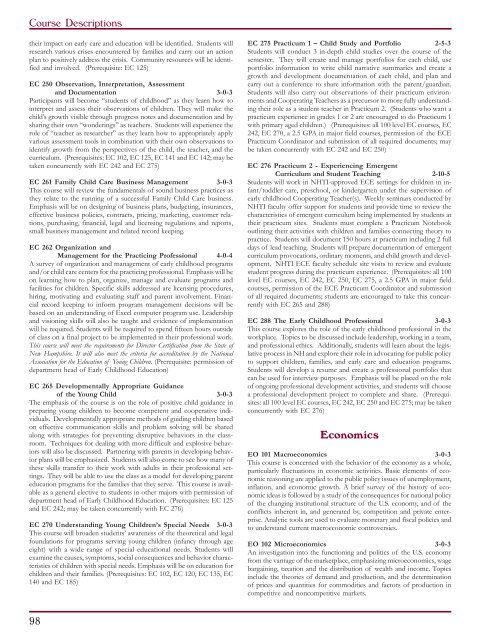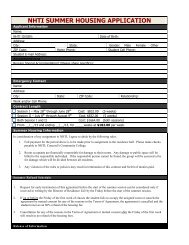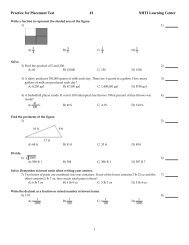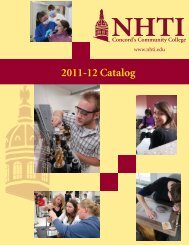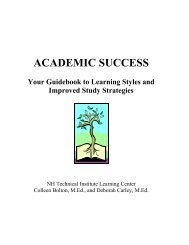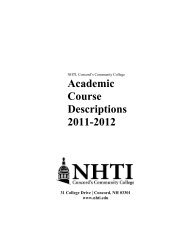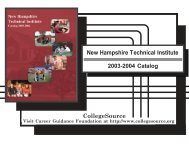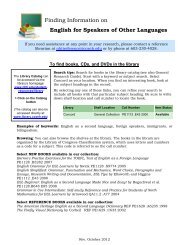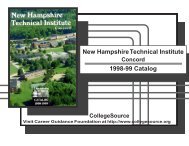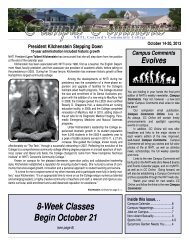Catalog 05-06 - NHTI - Concord's Community College
Catalog 05-06 - NHTI - Concord's Community College
Catalog 05-06 - NHTI - Concord's Community College
- No tags were found...
Create successful ePaper yourself
Turn your PDF publications into a flip-book with our unique Google optimized e-Paper software.
Copyright & Disclaimer Information: Copyright © 1994, 1995, 1996, 1997, 1998, 1999, 2000, 2001, 2002, 2003, 2004, 20<strong>05</strong>, 20<strong>06</strong>, 2007. <strong>College</strong>Source®, Inc. and Career Guidance Foundation. <strong>College</strong>Source® digital catalogs are derivative works owned and copyrighted by <strong>College</strong>Source®, Inc. and Career Guidance Foundation. <strong>Catalog</strong> content is owned and copyrighted by the appropriate school. While <strong>College</strong>Source®, Inc. and Career Guidance Foundation provides information as a service to the public, copyright is retained on all digital catalogs.Copyright & Disclaimer Information: Copyright © 1994, 1995, 1996, 1997, 1998, 1999, 2000, 2001, 2002, 2003, 2004, 20<strong>05</strong>, 20<strong>06</strong>, 2007. <strong>College</strong>Source®, Inc. and Career Guidance Foundation. <strong>College</strong>Source® digital catalogs are derivative works owned and copyrighted by <strong>College</strong>Source®, Inc. and Career Guidance Foundation. <strong>Catalog</strong> content is owned and copyrighted by the appropriate school. While <strong>College</strong>Source®, Inc. and Career Guidance Foundation provides information as a service to the public, copyright is retained on all digital catalogs.Course Descriptionstheir impact on early care and education will be identified. Students willresearch various crises encountered by families and carry out an actionplan to positively address the crisis. <strong>Community</strong> resources will be identifiedand involved. (Prerequisite: EC 125)EC 250 Observation, Interpretation, Assessmentand Documentation 3-0-3Participants will become “students of childhood” as they learn how tointerpret and assess their observations of children. They will make thechild’s growth visible through progress notes and documentation and bysharing their own “wonderings” as teachers. Students will experience therole of “teacher as researcher” as they learn how to appropriately applyvarious assessment tools in combination with their own observations toidentify growth from the perspectives of the child, the teacher, and thecurriculum. (Prerequisites: EC 102, EC 125, EC 141 and EC 142; may betaken concurrently with EC 242 and EC 275)EC 261 Family Child Care Business Management 3-0-3This course will review the fundamentals of sound business practices asthey relate to the running of a successful Family Child Care business.Emphasis will be on designing of business plans, budgeting, insurances,effective business policies, contracts, pricing, marketing, customer relations,purchasing, financial, legal and licensing regulations and reports,small business management and related record keeping.EC 262 Organization andManagement for the Practicing Professional 4-0-4A survey of organization and management of early childhood programsand/or child care centers for the practicing professional. Emphasis will beon learning how to plan, organize, manage and evaluate programs andfacilities for children. Specific skills addressed are licensing procedures,hiring, motivating and evaluating staff and parent involvement. Financialrecord keeping to inform program management decisions will bebased on an understanding of Excel computer program use. Leadershipand visioning skills will also be taught and evidence of implementationwill be required. Students will be required to spend fifteen hours outsideof class on a final project to be implemented in their professional work.This course will meet the requirements for Director Certification from the State ofNew Hampshire. It will also meet the criteria for accreditation by the NationalAssociation for the Education of Young Children. (Prerequisite: permission ofdepartment head of Early Childhood Education)EC 265 Developmentally Appropriate Guidanceof the Young Child 3-0-3The emphasis of the course is on the role of positive child guidance inpreparing young children to become competent and cooperative individuals.Developmentally appropriate methods of guiding children basedon effective communication skills and problem solving will be sharedalong with strategies for preventing disruptive behaviors in the classroom.Techniques for dealing with more difficult and explosive behaviorswill also be discussed. Partnering with parents in developing behaviorplans will be emphasized. Students will also come to see how many ofthese skills transfer to their work with adults in their professional settings.They will be able to use the class as a model for developing parenteducation programs for the families that they serve. This course is availableas a general elective to students in other majors with permission ofdepartment head of Early Childhood Education. (Prerequisites: EC 125and EC 242; may be taken concurrently with EC 276)EC 270 Understanding Young Children’s Special Needs 3-0-3This course will broaden students’ awareness of the theoretical and legalfoundations for programs serving young children (infancy through ageeight) with a wide range of special educational needs. Students willexamine the causes, symptoms, social consequences and behavior characteristicsof children with special needs. Emphasis will be on education forchildren and their families. (Prerequisites: EC 102, EC 120, EC 135, EC140 and EC 185)EC 275 Practicum 1 – Child Study and Portfolio 2-5-3Students will conduct 3 in-depth child studies over the course of thesemester. They will create and manage portfolios for each child, useportfolio information to write child narrative summaries and create agrowth and development documentation of each child, and plan andcarry out a conference to share information with the parent/guardian.Students will also carry out observations of their practicum environmentsand Cooperating Teachers as a precursor to more fully understandingtheir role as a student teacher in Practicum 2. (Students who want apracticum experience in grades 1 or 2 are encouraged to do Practicum 1with primary aged children.) (Prerequisites: all 100 level EC courses, EC242, EC 270, a 2.5 GPA in major field courses, permission of the ECEPracticum Coordinator and submission of all required documents; maybe taken concurrently with EC 242 and EC 250)EC 276 Practicum 2 - Experiencing EmergentCurriculum and Student Teaching 2-10-5Students will work in <strong>NHTI</strong>-approved ECE settings for children in infant/toddlercare, preschool, or kindergarten under the supervision ofearly childhood Cooperating Teacher(s). Weekly seminars conducted by<strong>NHTI</strong> faculty offer support for students and provide time to review thecharacteristics of emergent curriculum being implemented by students attheir practicum sites. Students must complete a Practicum Notebookoutlining their activities with children and families connecting theory topractice. Students will document 150 hours at practicum including 2 fulldays of lead teaching. Students will prepare documentation of emergentcurriculum provocations, ordinary moments, and child growth and development.<strong>NHTI</strong> ECE faculty schedule site visits to review and evaluatestudent progress during the practicum experience. (Prerequisites: all 100level EC courses, EC 242, EC 250, EC 275, a 2.5 GPA in major fieldcourses, permission of the ECE Practicum Coordinator and submissionof all required documents; students are encouraged to take this concurrentlywith EC 265 and 288)EC 288 The Early Childhood Professional 3-0-3This course explores the role of the early childhood professional in theworkplace. Topics to be discussed include leadership, working in a team,and professional ethics. Additionally, students will learn about the legislativeprocess in NH and explore their role in advocating for public policyto support children, families, and early care and education programs.Students will develop a resume and create a professional portfolio thatcan be used for interview purposes. Emphasis will be placed on the roleof ongoing professional development activities, and students will choosea professional development project to complete and share. (Prerequisites:all 100 level EC courses, EC 242, EC 250 and EC 275; may be takenconcurrently with EC 276)EconomicsEO 101 Macroeconomics 3-0-3This course is concerned with the behavior of the economy as a whole,particularly fluctuations in economic activities. Basic elements of economicreasoning are applied to the public policy issues of unemployment,inflation, and economic growth. A brief survey of the history of economicideas is followed by a study of the consequences for national policyof the changing institutional structure of the U.S. economy, and of theconflicts inherent in, and generated by, competition and private enterprise.Analytic tools are used to evaluate monetary and fiscal policies andto understand current macroeconomic controversies.EO 102 Microeconomics 3-0-3An investigation into the functioning and politics of the U.S. economyfrom the vantage of the marketplace, emphasizing microeconomics, wagebargaining, taxation and the distribution of wealth and income. Topicsinclude the theories of demand and production, and the determinationof prices and quantities for commodities and factors of production incompetitive and noncompetitive markets.98


